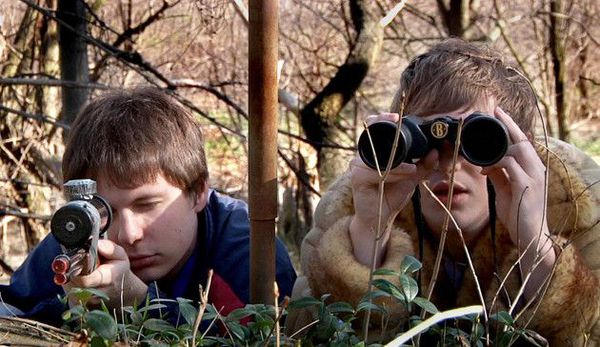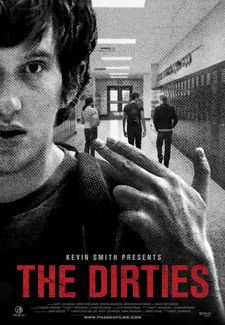 |
| Different perspectives in The Dirties. |
Finally making its way to the UK after winning awards at the Slamdance (Best Narrative Feature Winner), Vancouver and Toronto film festivals and earning the support of Clerks director Kevin Smith in the process, Matt Johnson’s debut feature The Dirties grapples with tragic subject matter that comes ripped straight from the headlines. Employing a mock-documentary approach, Johnson’s film (co-written with Evan Morgan and from a story by Josh Boles), focuses on two school friends and movie addicts, Matt and Owen, who are the targets of regular and vicious bullying from the school jocks grudgingly referred to as ‘The Dirties’ by the long-suffering duo. Matt and Owen, when we first meet them, have arranged to be followed by a camera team with the intention of documenting their attempt to put together their home-made revenge movie for a school project. Titled The Dirties, their DIY no-budget submission to their class is a revenge splatterfest that pays homage to their love of action and sci-fi movies. The plot, for what it is, sees the pair play exaggerated, gun-packing alter egos of themselves who effortlessly demolish their school nemeses with a hail of bullets, knives, and movie catchphrases.
 |
| The Dirties poster |
However, when their presentation to class is over, Matt has the camera team stick around and record the production of his next epic home-made movie, one which increasingly begins to take on the shape of a dark obsession as opposed to the earlier lighthearted homage. Though Owen initially laughs it off, Matt’s intention appears to be to film The Dirties again; but for real this time. As in real guns and real casualties. But it will be okay, Matt says repeatedly, because just as in his favourite movies where the good guys always win, their film’s avengers would not be Columbine-style crazies but would only go ‘for the bad guys’. As Matt grows visibly more intense about his plan, questions begin to nag away at both Owen and the viewer. Is this just an attempt to push an idea right up to the edge of execution so as to provoke? Or, as we see Owen start to suspect, has Mat started to lose sight of the borders of reality in this grand attempt to shape his own destiny and have his revenge?
Owen Van Spall: How and why did you settle on this controversial subject matter for your debut film, and why then take the mock-doc approach?
Matt Johnson: Well, the idea was to make a fake documentary. We were really inspired by a Belgian film called Man Bites Dog, which is an insanely impressive first feature, so far ahead of its time it's ridiculous. It is a fake documentary about a guy who goes around Brussels in Belgium basically killing people. And that was huge inspiration for me and Josh Boles, along with the Orson Welles film F For Fake. We were just compelled to do something in that same style - it's all a lie, but it's also all real. I wanted to play myself, I wanted everyone around me to be real, I wanted it to feel like a real situation whilst doing something so dark you almost couldn't believe it was real at the same time. I find Man Bites Dog quite comedic, whereas I think we were trying to keep our film more like a real documentary.
Why found footage? I think it's not entirely a correct distinction. Really, here what we are trying to do is show you the kind of footage that would be shot by a kid. That is different from found footage, as the conceit with found footage is that it is something found accidentally and put together by the government or something. That is not what happened here. Matt shot this movie with the intention of making an actual film, and the intention of people seeing it.
OVS: I wanted to ask you about the tone of the film. I found it very funny, but there is a growing sense of doom too.
MJ: I think the tone is all happening in the audience’s mind. I think as you as the audience begin to learn more about what is happening, so you begin to realise ‘my god, this could go bad!’. But for us, I was not thinking about scaring the audience at particular moments, it just kind of happened by accident.
OVS: Have you got a feel for the reaction the film is provoking in audiences, and particularly those communities affected by the subject matter within the film?
MJ: Yeah, whenever we screen the film in high schools, those are always the best screenings because I think young people understand this movie in a way that others don’t. We shot the movie after all in real high schools with real school kids. So the reaction from my generation I feel, and the generation below, has been really positive. The film is out on Netflix now in the US. That has been a real eye-opener. Now there are thousands of people seeing the film at the same time and then writing in on sites like Letterboxd to express their views, and that makes this a completely different experience to when films like this were just released theatrically in the past. That has been really rewarding.
OVS: I’d like to talk to you about the themes and concepts the films tackles. A surface level reading might just see it as a critique of movie violence and guns. To me I read into it a study not just of bullying and its terrible effects but also of surveillance culture, and the dangerous appeal of action cinema narratives that promote easy ‘kill the bad guy’ solutions as opposed to showing the real consequences of violent acts.
MJ: I actually never really thought of the surveillance element!
OVS: There is a scene where Owen shows Matt how they can set up surveillance cameras outside the girls' lockers. It just served to remind me of how kids these days can become filmmakers, or spies, so easily with off-the-shelf kit thanks to technological developments.
MJ: Well that is all about something that is allowing you to become your own movie star. Deeply, at its heart, this is a film about a young kid who wants desperately to become a movie star. He is trying to become the star of his own film, and he believes that that, somehow, will be the solution to all his problems. I think the key point in the film where this becomes clear is when Matt stops referencing famous movies and quotes and scenes from them, and begins to create his own movie. He starts quoting himself, and openly debating what he, as a movie character, will be like And that shift really is the central axis of the entire film. As a society, more and more we are making ourselves into movie stars, whether it be through Facebook or selfies. We have Avatars, all part of a massive machine that allows us to say: ‘this is me, look at me’.
OVS: The scene where Matt is on the cliff, directing himself, springs to mind as really key here.
MJ: Exactly, that is where we see Owen forcing Matt, or trying as best he can to force Matt, to confront psychologically what he is doing: which is that he is always acting, he has become this ersatz simulacrum of the real person. Matt of course vehemently denies there is a difference, saying at several points: ‘this is me, I am me, and this movie is me, so don't get in the way’. Matt continues to be that movie character right to the end.
OVS: And the kind of movies Matt likes are those which offer clean cut solutions through violence to all kinds of problems.
MJ: Bingo! That's why to him, when he does what he does, there is no need to ask about ethics or morals. The good guys have to kill the bad guys. You do what you need to do to get to act three. Nothing else matters. So you killed 50 guys? What does it matter if you were the hero? You aren't going to jail. Matt is now immune to the reality of what is going on. Which is what I liked about combining the fake documentary approach with all these action film narrative cliches; by that I mean that if what Matt was doing was taking place in a by-the-numbers action film, he’d probably get away with it!
I keep thinking about how our film compares to the Schwarzenegger film The Last Action Hero: in which there is the movie world and the real world. In our film, we are trying to make the real world the ‘real real world’. Formally that film is fascinating, I wonder why we don’t see more films like that. I like to think our movie is a little like that, in that Matt thinks he is in that movie narrative where good conquers evil and there will be zero bad consequences for the hero. But in reality he is in a documentary about real life. He can’t see the difference.
OVS: Have you found people have been led by the design of the film to come up with left-field readings of it? I personally found myself wondering if the final minutes of what we were seeing was ‘the real world’ being filmed by the camera crew, or was this whole thing still Matt and Owen’s class project but on a bigger scale?
MJ: Some audiences have wondered if the camera crew and their cameras actually exist. Thoughts about that kind of ambiguity did cross our minds, but such a reading wasn't really our intention. To us, this is a movie that Matt is making. The idea was interesting, yes: that at some point we might cut back and show the camera crew in some way and suggest it was staged. But we didn't go that way. The problem is then that we would've let everyone off the hook, nothing would matter, and there would be no tragedy. I think it would've undercut us. Lots of people have different explanations for the end of the film, especially as we keep the camera operator somewhat ambiguous. We were trying to create a complicity with the audience, that definitely is happening there.
The Dirties opens in the UK on 6 June 2014.
Matt Johnson will be attending screenings of the film at the Hackney Picturehouse and Genesis Cinemas in London on Friday 6 June.





















